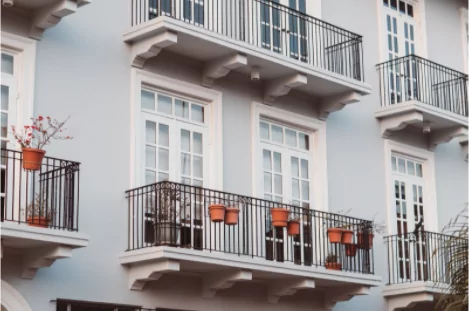Security deposit interest rates and rules vary significantly across the United States. This guide covers everything you need to know about security deposit interest rates in 2025, including state rules, current rates, and how to calculate interest on security deposits.
Key takeaways
- Many jurisdictions require landlords to pay interest on tenant security deposits, with rates varying by location and year.
- Each state has specific rules regarding security deposit interest rates, returns, and requirements for a separate landlord bank account or escrow account for security deposits.
- The interest rate on security deposits can vary based on state legislation, economic conditions, or local ordinances that override state laws.
- Certain cities require security deposit interest rates to align with passbook savings account rates at major banks.
- The formula to calculate the interest rate on security deposits is Interest = Principal × Rate × Time.
What are security deposit interest rates?
A security deposit interest rate is the percentage of interest that a landlord must pay a tenant on their security deposit during the lease term. In certain states, landlords must hold security deposits in interest-bearing accounts and pay the interest earned to tenants. The obligation to pay interest, as well as the specific rate, varies based on state and local regulations.
Check your state laws for additional requirements to provide tenants with a security deposit receipt or real estate banking details of where deposits are being held.
Top U.S. city interest rate requirements
Many major U.S. cities set their own requirements for the rate of interest on security deposits under rental agreements, overriding general state requirements. Here’s a look at the 2025 interest rate requirements in key cities:
Chicago security deposit interest rate
In Chicago, landlords must pay interest each year on security deposits and prepaid rent held for more than six months. For 2025, the city has set the required interest rate at 0.01%.
This rate is reviewed and published annually by the Chicago City Comptroller. Interest must be paid to tenants in cash or a credit towards rent within 30 days after the end of each 12-month rental period.
Los Angeles security deposit interest rate
Landlords who own rent-stabilized property in Los Angeles are required to pay interest on security deposits held for at least one year. The city’s Rent Adjustment Commission reviews and sets this rate annually. For 2025, the required interest rate is 4.32%.
Accrued interest must be paid to tenants monthly or annually in the form of a direct payment or a credit against rent. The landlord must choose between the two methods of payment and notify the tenant in writing.
New York security deposit interest rate
In New York State, the rules around security deposit interest depend on the size of the rental property. For buildings with six or more units, landlords must place tenant security deposits in interest-bearing accounts and pay tenants interest earned minus a 1% administrative fee. For example, if the account earns 2.5% in interest, the tenant receives 1.5%, and the landlord keeps 1% as a fee.
For buildings with fewer than six units, deposits don’t have to be held in interest-bearing accounts. However, if landlords choose to, the same rules apply—the tenant receives the interest earned minus the allowable 1% fee.
San Francisco security deposit interest rate
Landlords renting out a property in San Francisco are required to pay interest on security deposits held for more than one year. For the period from March 1, 2025, to February 28, 2026, the required interest rate is 5.0%—slightly down from the 5.2% rate set the previous year.
Security deposit interest must be paid annually to tenants as direct payments or rent credits. For units covered by the Rent Ordinance, landlords can deduct 50% of the Rent Board fee from security deposit interest payments.
State-by-state security deposit interest rate rules
| State | Maximum Deposit | Interest Required | Rules |
|---|---|---|---|
| Arizona | 1.5 months' rent | Yes | Only for mobile home rentals; 5% paid annually or compounded. |
| California | 1 to 2 month's rent | No | Required in certain cities; 0.01% to 5% paid annually or upon termination. |
| Connecticut | 2 months' rent (1 month for tenants 62 years of age or older) | Yes | 2025 rate is 0.52%, paid annually as a credit or directly to tenant. |
| Florida | No limit | Yes | Landlords pay 75% of earned interest or 5% per year on interest-bearing accounts. |
| Illinois | No limit | Yes | Required for landlords with 25+ units; 0.01% paid annually as a credit or cash. |
| Iowa | 2 months' rent | Yes | Interest earned in the first five years goes to the landlord, then to the tenant. |
| Maine | 2 months' rent | Yes | Required for mobile homes; must be Federal Reserve rates, paid upon termination. |
| Maryland | 2 months' rent | Yes | The interest rate is a one-year U.S. Treasury yield or 1.5%, which is greater; paid upon termination. |
| Massachusetts | 1 month's rent | Yes | Landlords must pay 5% interest or the actual rate earned annually, whichever is less. |
| Minnesota | No limit | Yes | 1% simple interest paid upon termination. |
| New Hampshire | 1 month's rent | Yes | Required for deposits held over one year; standard rate for savings accounts paid upon request or termination. |
| New Jersey | 1.5 months' rent | Yes | Landlords must pay the actual interest earned annually as a credit or cash. |
| New Mexico | 1 month's rent (leases under 1 year); no limit for longer leases | Yes | Required for deposits exceeding one month's rent; paid annually at security deposit passbook interest rates. |
| New York | 1 month's rent | Yes | Required for buildings with 6+ units; paid annually, less 1% for landlord admin fee. |
| North Dakota | 1 or 2 months’ rent (depends on pets or criminal history) | Yes | Required for deposits held over nine months; actual interest earned paid upon termination. |
| Ohio | No limit | Yes | Required for deposits exceeding one month's rent and held for six months or more; 5% paid annually on the excess amount. |
| Pennsylvania | 2 months' rent | Yes | Required for deposits held over two years; actual interest earned paid annually. |
| All Others | Varies | No | No other states require interest on security deposits. |
Factors influencing security deposit interest rates
Several elements determine the interest rates on security deposits:
- State legislation: Each state sets its regulations, generally requiring a certain security deposit interest rate percentage or standard passbook rates on savings accounts. In Massachusetts, landlords must pay 5% interest or the actual rate earned annually, whichever is less.
- Economic conditions: Prevailing economic factors, such as federal interest rates, can cause rates to fluctuate based on market conditions. Maryland security deposit interest requires landlords to pay 1.5% per year or the rate of a one-year U.S. Treasury yield, whichever is higher.
- Local ordinances: Some cities have specific rules that supersede state laws. The municipal rule in Chicago requires landlords to pay 0.01% interest on security deposits and prepaid rent, overriding Illinois state law that only mandates interest for larger buildings with 25 units or more.
These factors influence the amount of interest owed and how landlords manage security deposit dispositions, including interest returns when a lease ends.
How to calculate interest on a security deposit
Calculating interest on a security deposit involves the simple interest formula:
Interest = Principal × Rate × Time
- Principal: The initial security deposit amount.
- Rate: The annual interest rate (expressed as a decimal).
- Time: The duration the deposit is held (in years).
Example calculation:
If a tenant provides a $1,000 security deposit at an annual interest rate of 1% for a one-year lease:
- Interest = $1,000 × 0.01 × 1 = $10
Therefore, the tenant would earn $10 in interest over the year.
Interest on deposits is paid to tenants monthly, annually, or upon request, depending on state laws. Landlords must return deposits and any interest when a lease ends, outlining the total amount in a security deposit refund letter.
Security deposit passbook interest rates
Passbook interest is the interest earned on security deposits held by landlords, calculated based on rates comparable to those of regular savings accounts.
Examples:
- Illinois: Security deposit interest must be paid to tenants at a rate equal to the minimum passbook savings account interest rate paid by the largest Illinois commercial bank as of December 31 of the year before the beginning of the lease.
- New Mexico: If a security deposit exceeds one month’s rent, landlords must pay interest on the excess amount at a rate equal to the passbook interest permitted to savings and loan associations in this state by the federal home loan bank board.
Earn up to 3.35% APY2 on security deposits with Baselane
Managing security deposits and the interest earned can quickly become complicated, especially when you’re juggling different state regulations and bank accounts. Baselane makes it easy.
With Baselane banking, you can open unlimited accounts for each property to start collecting security deposits and rent payments online in a matter of minutes. Avoid monthly fees and minimum balance requirements while earning up to 3.35% APY2—significantly higher than traditional savings accounts. Plus, you can screen tenants, e-sign leases, and automate bookkeeping (plus more) all in the same place for complete control over your cash flow without all the extra admin.
Ready to get started? Open a free security deposit account today.
FAQs
To calculate interest on a security deposit, follow these steps:
- Know the interest rate: Check if there’s a specified interest rate for security deposits according to your local laws.
- Determine the deposit amount: Identify the total amount of the security deposit you collected.
- Calculate the time period: Determine how long the deposit has been held. This is usually measured in years but can also be in months.
- Use the formula: The basic formula to calculate simple interest is Interest = Principal × Rate × Time
For example, if you have a $1,000 security deposit with an interest rate of 3% held for 2 years, the calculation would be: $1,000 x 0.03 x 2 = $60. So, a tenant would earn $60 in interest over those 2 years.
Check state laws for when to pay tenants interest on deposits and how to handle returns and security deposit deductions.
Security deposit interest rates are set by state regulations. Regulators look at savings or passbook interest rates to establish a fair benchmark. As economic conditions change, such as when the Federal Reserve adjusts its rates, the interest rates on security deposits can also change. Ultimately, the goal is to ensure tenants receive a reasonable return on their deposits while providing a clear framework for landlords to follow.
The interest rate on a landlord security deposit depends entirely on where your rental property is located. Some states set a fixed annual rate—like 0.01% in Chicago or 5.0% in San Francisco—while others tie the rate to what local banks offer on security deposit savings accounts. In many cases, the rate is updated each year to reflect changes in the economy.








